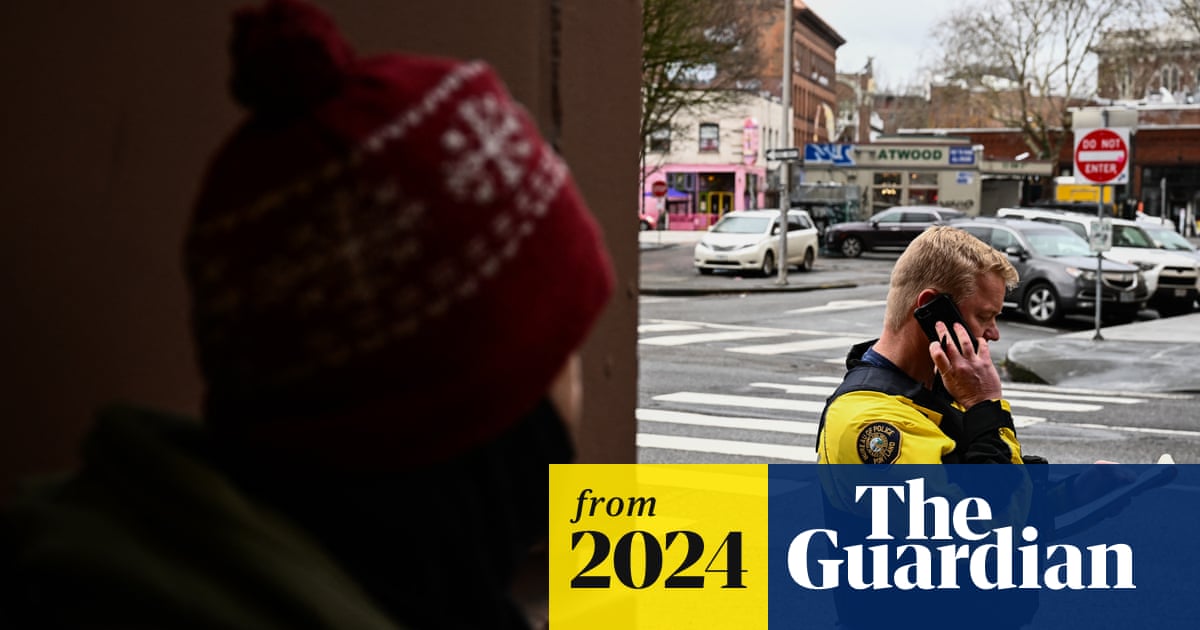
How Oregon turned on its own trailblazing drug law: ‘Not the utopia we were promised’
Three years ago, the state began a novel social experiment that put treatment over punishment – then came the backlash


A police officer writes a ticket for smoking drugs in public in downtown Portland, Oregon, on 25 January 2024. Photograph: Patrick T Fallon/AFP/Getty Images
Oregon
How Oregon turned on its own trailblazing drug law: ‘not the utopia we were promised’
Three years ago, the state began a novel social experiment that put treatment over punishment – then came the backlash
Katia Riddle in Eugene and Portland
Wed 21 Feb 2024 07.00 EST
Holding his five-month-old daughter, Danny Schlabach sways gently on his feet in their small room at a youth shelter in Eugene, Oregon. Their room is scattered with the detritus of a new baby: A+D ointment, formula, baby shampoo, bottle brushes, six pairs of miniature shoes lined up in the closet.
‘We hold you sacred’: how a mobile drug unit is fighting the opioid crisis in the Cherokee Nation

‘We hold you sacred’: how a mobile drug unit is fighting the opioid crisis in the Cherokee Nation
Read more
Schlabach, 23, is wildly in love with this child – his first. Her tiny fuchsia sweatsuit, her shock of dark hair. He’s raising her mostly alone. “I wasn’t really on the right track, until I got her,” he says. “When that happened I realized – I have to shape up.”
Housing has been a constant challenge in his life, given his history with drugs, addiction and arrest, and his troubled relationship with his daughter’s mom, and he marvels at his luck in finding a place to live that’s safe, free and comfortable. “I never want to live in a car with my kid,” he says. “But I’ve seen how it happens.”
The shelter where Schlabach and his daughter live is run by an organization called Looking Glass, and is funded primarily through Oregon’s Measure 110.
When voters approved Measure 110 in 2020, they made Oregon the scene of a novel social experiment in the US by decriminalizing the possession of small amounts of hard drugs and funneling hundreds of millions of dollars into substance abuse treatment.
The vote was celebrated as a groundbreaking step toward a compassionate approach to substance use disorders, one that prioritized treatment over punishment. But nearly three years after its passage, the law has become the subject of fierce debate as Oregon, like many US states, grapples with a spiraling opioid crisis.[/SIZE]
Oregon was a leader in this space. [Repealing Measure 110] will set us back
Haven Wheelock, harm-reduction advocate
In recent months, residents, business owners and law enforcement agents in Oregon have all pointed to spiraling drug use – in downtowns, where people openly smoke fentanyl while others lie unconscious in doorways; in small towns, where mayors unaccustomed to homelessness are suddenly grappling with encampments; in terrifying newspaper stories about middle-class families grieving teenagers who lost their lives due to one bad pill.
Lawmakers are now considering a number of bills that would reinstate criminal penalties such as fines and jail time for drug possession – a decision that could come any day. A coalition led by prominent business owners have threatened to mobilize an effort to hobble the law even more by putting it back to the public in a ballot measure in the fall. Recent polling has shown more than half of voters support a total repeal.
‘I don’t see how it ends’: expert sounds alarm on new wave of US opioids crisis


‘I don’t see how it ends’: expert sounds alarm on new wave of US opioids crisis
Read more
What happens next is seen as a national litmus test for public tolerance to a harm-reduction approach to addiction and drug use, particularly in cities like San Francisco, where lawmakers are grappling with similar complaints from residents over open-air drug use. While advocates acknowledge the measure hasn’t been perfect, many fear the backlash has been driven by emotion rather than data, and argue the state’s new system for dealing with addiction and substance use needs time to mature.
At the heart of all this is a question: what does society owe people like Schlabach, and to what extent should they be considered criminal?
For Haven Wheelock, a harm-reduction advocate whose works for an organization in Portland that has received funding from Measure 110, the danger of walking back the law is, in part, existential. “I think it’s going to make policymakers less brave,” she explained. “Oregon was a leader in this space. It will set us back.”
A bold vision, or a ‘dystopian nightmare’?
When Oregon voters passed Measure 110 with nearly 60% support, the vision that advocates laid out was grand.
The state would deconstruct the existing punitive and ineffective system that criminalized drugs, and build a new apparatus in its place. People would no longer face criminal penalties for possession of small amounts of substances like fentanyl and methamphetamine; long-calcified pathways through the criminal justice system that reinforced societal inequalities would be abandoned; treatment options for those struggling with addiction – funded with hundreds of millions of dollars from the state’s legal marijuana tax – would be widely available.
But Measure 110 passed on the eve of a tsunami of twin public health crises in Oregon: an epidemic of cheap, widely available and extremely dangerous fentanyl, and a sharp escalation in the shortage of affordable housing.

A person covered with a blanket walks past an encampment near Union Station in Portland in January. Photograph: Patrick T Fallon/AFP/Getty Images
Recent federal data show Oregon had the steepest increase in the country of overdose deaths since the pandemic started – by a staggering 1,500%. Nearly 1,000 people in Oregon died from opiate overdoses in 2022. Public health officials warn the crisis shows no signs of abating.




